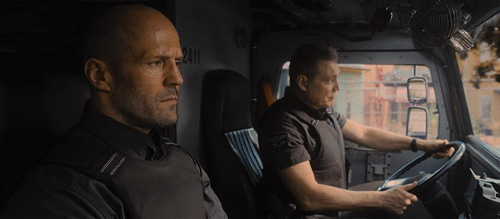Wrath of Man (2021) Review
Wrath of Man (2021)
Director: Guy Ritchie
Screenwriter: Guy Ritchie
Starring: Jason Statham, Holt McCallany, Josh Hartnett, Scott Eastwood, Jeffrey Donovan, Laz Alonso, Post Malone, Eddie Marsan, Andy Garcia
Guy Ritchie is a filmmaker who lives and dies by his own writing.
When he’s firing on all cylinders, when his writing is punchy and verbose and particularly fun to lean into, he’s one of the best directors working today. When he’s not, when his writing is performatively masculine and acutely focused on male camaraderie over all else, he’s serviceable if completely unremarkable, the resulting film lacking in much energy or panache. Wrath of Man is such a film, a fine-as-Walmart-wine crime picture that gets by on a couple of thrilling heist sequences, tricky time-release editing, and Jason Statham’s glum, intimidating presence.
Aladdin was a kitschy disaster, but Ritchie followed it with The Gentlemen, his best offering since the cult classic Snatch. The Gentlemen was filled to the brim with delectable performances, scenery-chewing monologues, and atmosphere to spare. For the most part, Wrath of Man has none of that. Instead, its vast supporting cast is mostly wasted, and Ritchie’s patented dialogue is reduced to jocular ribbing and dull, unrepeatable one-liners. Holt McCallany, so good under the gaze of David Fincher in ‘Mindhunter’, delivers a pretty disappointing performance here as a duplicitous armored truck dealer, unable to add layers to a script that offers very little in the way of personalities, if often leaving room for committed players to elevate the material. Either the cast wasn’t committed or they lack the ability for such a task. From Jeffrey Donovan to Scott Eastwood, Laz Alonso to Josh Hartnett, they’re often relegated to reading ill-suited dialogue like they’re, well, reading it. Only the ever-reliable Eddie Marsan, Andy Garcia, and Statham himself come through, though the latter is essentially fulfilling his contractual obligation for unending stoicism. Post Malone appears once again as a hood rat thief, for some reason choosing to make an acting career out of throwaway cameos in trashy crime pictures.
Wrath of Man manages to be mildly entertaining in spite of itself. The wily structure will keep any audience on its toes, tying together two genres (revenge and heist) for the purpose of revealing what drives Statham’s character as he infiltrates the aforementioned truck company. He’s a professional criminal of the organized sort moonlighting as an armored truck driver for reasons unknown, until Ritchie’s twisty narrative brings it all to light. However, so little time is spent on the past that the present is barely illuminated. Statham’s character still remains a mystery regardless of what vengeance he’s after. That’s what happens when you hire an actor like Statham, a performer of immense physicality but limited expressability. Fortunately, action sequences are juiced up via said physicality. Whether strangling an enemy with his own kevlar vest or firing precise headshots in quick succession, as if he were the best sharp-shooter on Earth, Statham’s action movie bonafides do some heavy legwork in telling us who this guy is at the outset.
What ultimately sinks the film on occasion are the vague sketches that pass for characters. Unlike The Gentlemen’s plethora of juicy roles, Wrath of Man is riddled with people who should mean something, yet never amount to anything. The partner and friend (McCallany) who’s not all that he seems? When it’s found out what he’s about, there’s not much to it, motivationally speaking. Sweat Boy Dave (Hartnett), the loudmouth who’s more so a wimp? Expectations are the enemy of joy at times, and such is the case if anyone were to enter Wrath of Man believing this film would be some kind of return to fame and fortune for Hartnett. When the supposedly reluctant killers – those taking armored truck after armored truck in a slew of disguises – start killing indiscriminately, there’s no reason given for the sudden change in tactics or moral compass. Because the job is bigger, the willingness to kill is stronger? These sorts of moral quandaries are given short shrift, if any shrift at all. The mastermind, the wild card, the brains of the operation, all known types and tropes are here at play, and they remain types, given less screen time than you’d imagine for who end up being the picture’s primary villains.
Wrath of Man often feels as if it was written by a man in his early twenties, who hasn’t yet matured emotionally or intellectually and, thus, finds depth in a pretty rote revenge story, one overly preoccupied with men being men. That would be wonderful if those men being men told us something about men, or if Ritchie recognized he was telling a story about the pitfalls of pride instead of asking his audience to simply join him on one violent ride down genre memory lane. Statham’s screen presence and the filmmaker’s admittedly unique camera placement during heist scenes make this an occasionally worthwhile endeavor, if a significant step down from his previous outing.
15/24
Written by Tony Ruggio
You can support Tony Ruggio in the following places:
Website – italianimposter
Letterboxd – /italianimposter
Twitter – @TonyRuggio


